For wholesalers and distributors, CRM has transitioned from being a mere need to an absolute necessity. Businesses in these sectors depend on efficiency, organization, and robust customer relationships to remain competitive. The right CRM for wholesale and distribution is crucial to ensuring a steady and growing revenue stream.
That said, picking the right wholesale CRM isn’t an easy task. With many options available, you can easily choose the wrong one.
In this CRM comparison article, we’ll analyze some of the best CRMs for wholesale and distribution. We’ll look at what sets each CRM apart, highlighting their strengths and weaknesses, and pricing in comparison to other solutions.
Why Distributors and Wholesalers Need CRM Software
Before we go to the best CRM list, let’s understand the significant sales and operational issues that most wholesalers and distributors face.
Despite significant growth in the wholesale and distribution industry, reaching $8.1 trillion in value (up from $5.3 trillion in 2016), wholesale distribution companies continue to face the same fundamental sales challenge: the complexities of the T-shaped sales decision workflow.
You’re expected to manage relationships with manufacturers, distributors, retailers, and customers (indirectly). Each of these organizations may have its own set of goals that conflict with other organizations (i.e., retailers demanding a volume discount that goes against manufacturer purchasing guidelines). This balancing act is lateral.
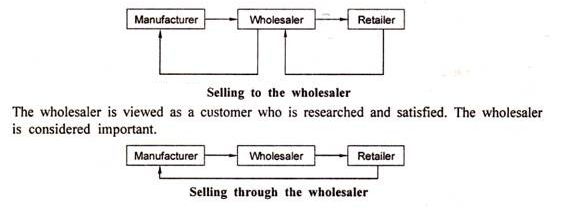
As it is, you’re forced to work with other organization types to support your customers (retailers).
And then, to add to that complexity, you have to deal with a variety of vertical (internal) issues.
- Inventory management challenges.
- Product liability
- Assessing product profitability
- Property damage mitigation
- Cyclical or unexpected changes to supply and demand
- Keeping up with technology
- Maintaining customer satisfaction
- Customer management and support
However, CRM software helps you tie these lateral and vertical challenges together, ensuring a strong solution that grows with your business. It enables you to manage your lateral relationships with manufacturers, distributors, retailers, and customers, and address your vertical challenges (via integrations and APIs) using your existing tools.
But which one is best for your business, though? There are so many tools on the market with pros and cons for different budgets and needs. So, here’s a short list of the best CRM software for wholesalers and distributors.
Overview of the Best CRM for Wholesalers and Distributors
After doing some research, here are the top eight CRMs for wholesalers and distributors and their best use cases:
- Pipeline CRM is the Best CRM for Sales-Driven Wholesale Teams
- Syspro CRM is the Best CRM for Distributors and Manufacturers
- Oracle NetSuite CRM is Best for Midsize, Large, and Global Wholesalers
- Odoo is the Best CRM for Wholesalers That Prefer Control via Open-Source Software
- SAP Business ByDesign is the Best CRM for Generalist Wholesale Teams
- Spotio is the Best Wholesale CRM with a Sales Territory Mapping Feature
- WizCommerce is the Best CRM Post-sales-Focused Wholesale Teams
- Method is the Best CRM Accounting-Focused Wholesale Teams
See in detail how each wholesale CRM is compared based on its features, pros and cons, user reviews, and pricing.
1. Pipeline CRM is the Best CRM for Sales-Driven Wholesale Teams
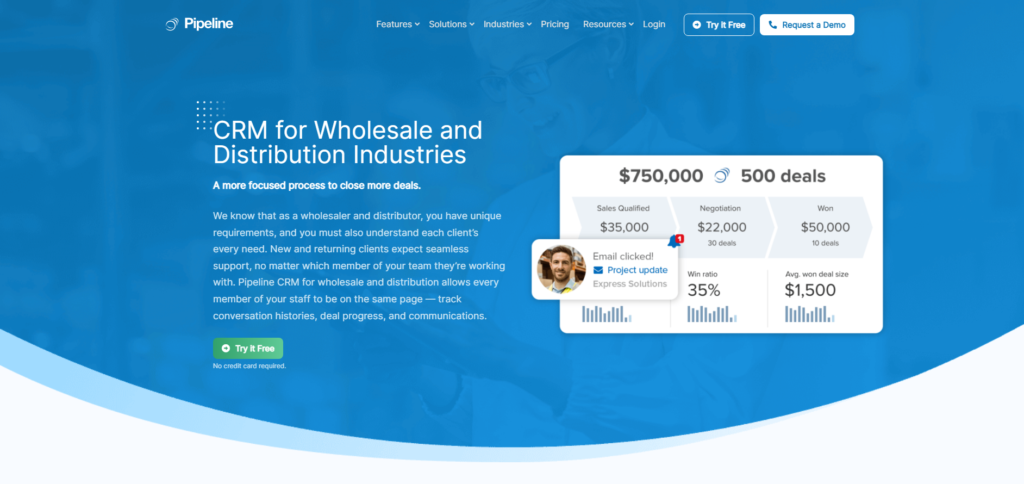
As a wholesaler and distributor, you must understand and accommodate your customers’ needs. Your customers (retailers) are under a significant amount of pressure to manage their customer’s needs and match their urgency.
Fortunately, Pipeline CRM for wholesale and distribution companies keeps every member of your staff on the same page with centralized communication — track conversation histories, deal progress, and communications. If your organization is focused on sales (i.e., attracting more retailer customers), then Pipeline is a great fit.
Features
Pipeline CRM has all of the standard CRM features plus…
- Custom deal stages to suit the unique steps in your wholesaling business
- Commissions, payouts, and incentive tracking
- Track and manage your email campaigns automatically via your account
- Seamless integration with all of the tools you’re already using
- Automation to automate next steps, activities, reminders, updates, etc.
- A complete record of the relationship lifecycle
- Smart agendas that build themselves as your team works, so everyone knows what needs to be done for each person/deal
- SuperShare to send data to trusted contacts quickly and securely
- Open-source APIs to integrate with anything and everything you’re already using
- Native integration with tools like Zapier to customize integrations without developer or IT assistance
Pros and Cons
- Pipeline is scalable yet very affordable
- Extensive sales management automation
- Integrates with a large list of software (e.g., Microsoft, QuickBooks, Google Apps, Zapier, Paycove, CallRail, etc.)
- Best-in-class customer support
- No on-premise options
- Best for small-to-medium organizations
Reviews
- 4.4/5 star rating on G2 (904 reviews total)
- 4.4/5 star rating on Capterra (616 reviews total)
- 9.8/10 score via TrustRadius
- 4.2/5 star rating via Gartner (41 reviews total)
Pricing
- Start plan: $29 per user per month
- Develop plan: $39 per user per month
- Grow plan: $59 per user per month
Learn more about Pipeline CRM’s pricing plan and features.
Watch this demo video to see Pipeline CRM in action and how it can improve your wholesale and distribution sales operations.
2. Syspro CRM is the Best CRM for Distributors and Manufacturers
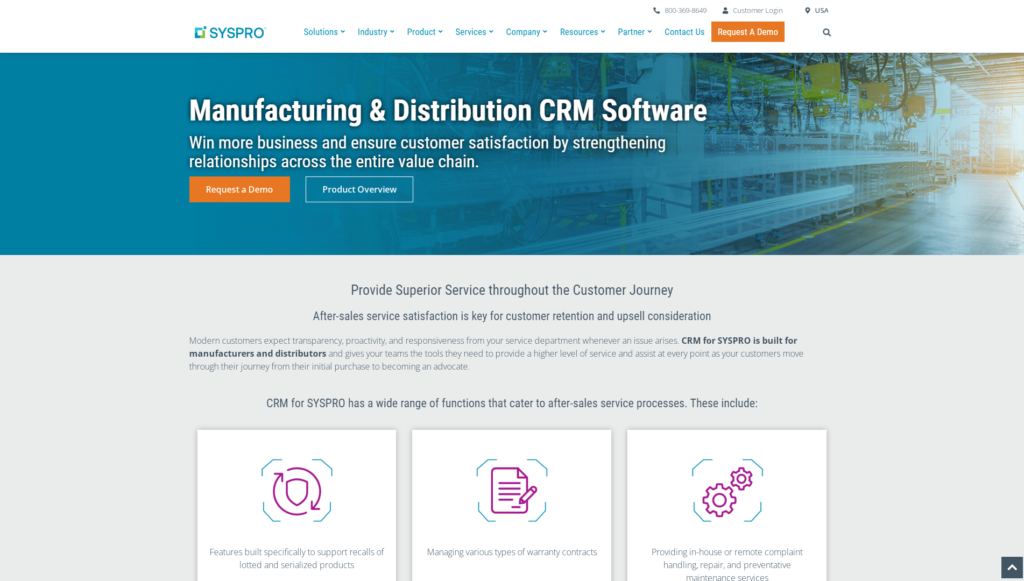
Syspro CRM is designed for manufacturers and their distributors.
Their CRM caters to manufacturing heavy industries – automotive, industrial machinery and equipment, food and beverage, fabrication, packaging, etc. They state that their product is “built for manufacturers and distributors who rely on loyal relationships up and down the supply chain, efficiency, and quality to be competitive.”
Features
Syspro has all of the standard CRM features, but it’s also…
- Built specifically to support recalls of lotted and serialized products
- Designed for various types of warranty contracts
- Created to provide in-house or remote complaint handling, repair, and preventative maintenance services
- Designed to manage customer service tasks, including custom automation case management
Pros and Cons
- Software is stable; multiple support options for bugs, errors, or issues
- Best-in-class support with rapid and consistent updates
- It can be overwhelming for small-to-medium size companies
- Navigation can be confusing; no links to other records
Reviews
- 4.1/5 star rating on G2 (200 reviews total)
- 4.2/5 star rating on Capterra (98 reviews total)
- 4.2/5 star rating via Gartner (41 reviews total)
- 8.9/10 score via TrustRadius
Pricing
- Call for a quote ($$$$)
3. Oracle NetSuite CRM is Best for Midsize, Large, and Global Wholesalers
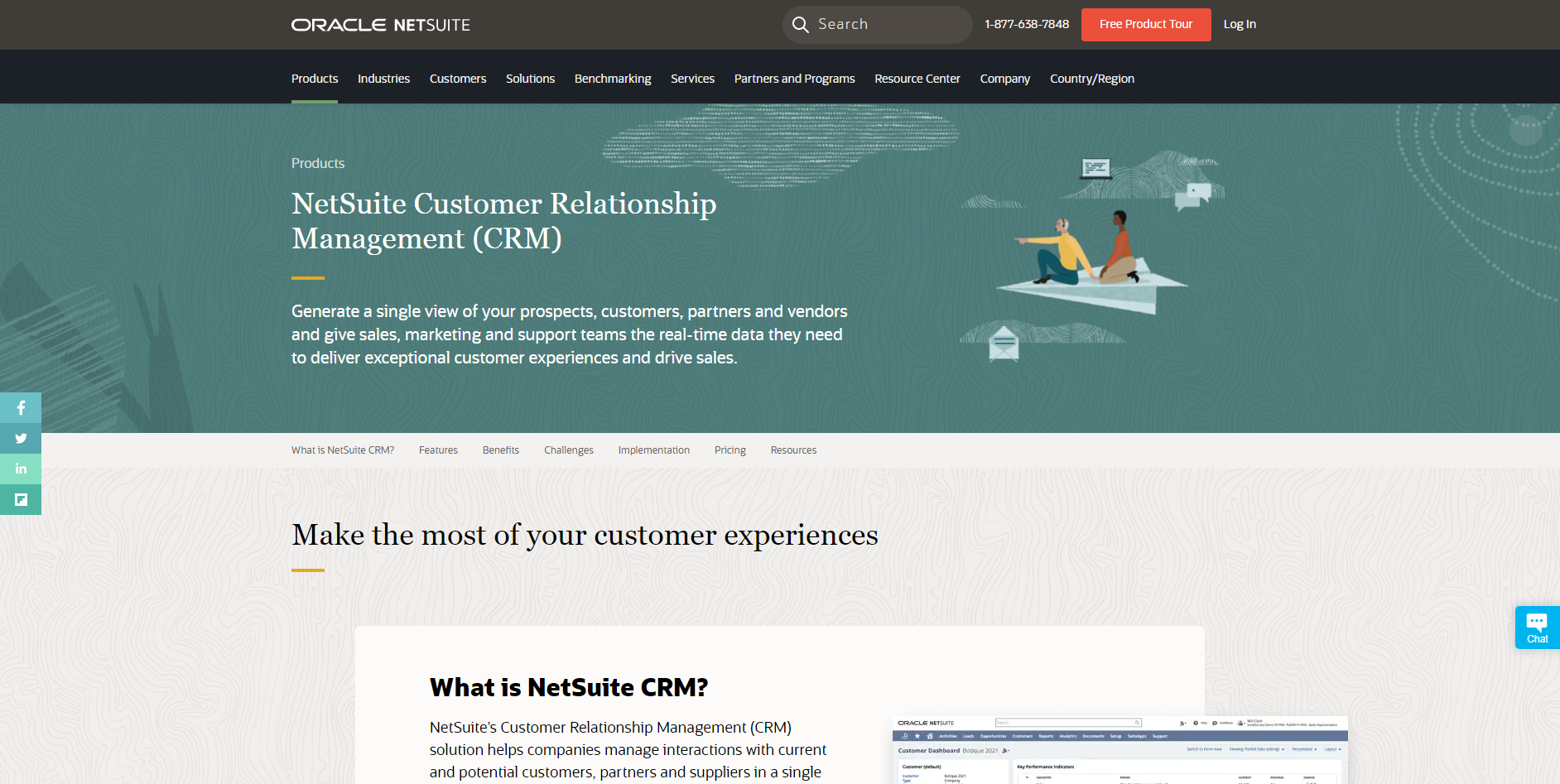
NetSuite has more than 32,000 customers in 215+ countries, so it makes sense that Gartner lists NetSuite as a leader in their Magic Quadrant. NetSuite is best for midsize, large, and global enterprises.
It is a comprehensive system that includes financials, HR, inventory management, professional services automation, CRM, and ERP.
Features
NetSuite has all of the standard CRM features plus…
- Sales force automation and pipeline management
- Strong customization capabilities and strong reporting features
- A customizable dashboard that provides A-Z views of all data points and areas of the business (e.g., leads, ops, customers, revenue, reports, etc.)
- Advanced customizations and ad hoc reporting
- A platform designed to work together (e.g., CRM, CX, HR, financials, etc.)
Pros and Cons
- All of your data across multiple departments (sales, CRM, HR, marketing, inventory management, etc.) in a single system
- A comprehensive system that works for a small organization but may be overkill
- Prohibitively expensive for many small-to-medium companies
- Not intuitive or easy to use. Requires lots of training, onboarding, and support
- Incredibly flexible, it can be customized in a variety of ways to meet user needs
- Significant investment of time for customization
- Additional fees for technical support
Reviews
- 4.0/5 star rating on G2 (2,305 reviews total)
- 4.1/5 star rating on Capterra (1,193 reviews total)
- 4.3/5 star rating via Gartner (159 reviews total)
- 7.8./10 score via TrustRadius
Pricing
- $129 – $999+ per mo. (paid annually)
- $$$$ for additional add-ons and modules
- $$$ for additional training
4. Odoo is the Best CRM for Wholesalers That Prefer Control via Open-Source Software
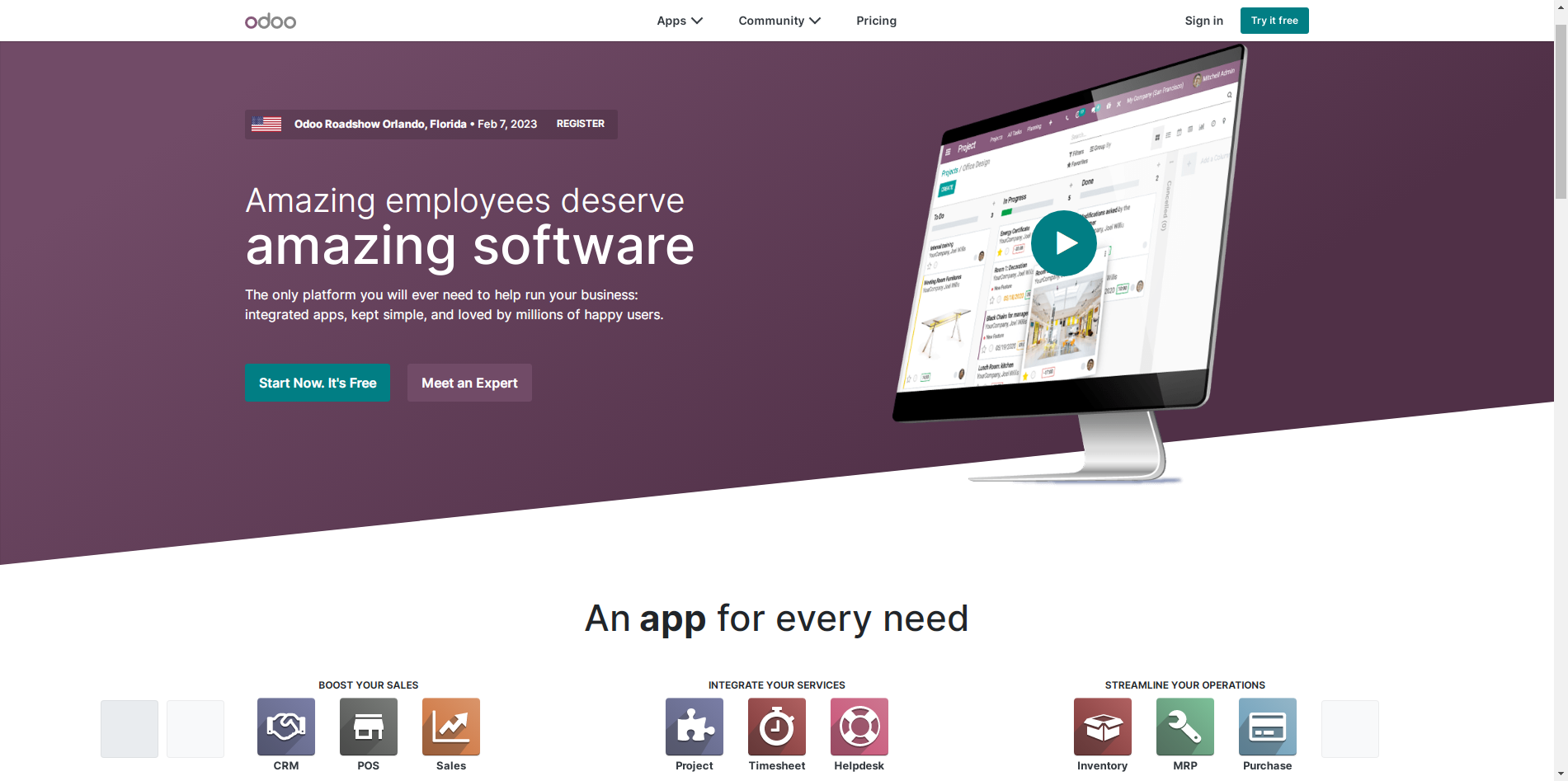
Odoo is a platform, an ecosystem of open-source apps that are designed to work together.
Odoo bills itself as “the only platform you will ever need to help run your business: integrated apps kept simple and loved by millions of happy users.” It offers a suite of apps across various categories, including sales, marketing, website, finance, inventory and manufacturing, HR, services, and productivity.
However, Odoo’s greatest strength is also its greatest weakness.
They provide consistent updates, but the nature of open-source software means you’ll need to add any additional functionality you need. If your organization is looking for that, Odoo is a great fit.
Features
- Full ecosystem of apps, modules, and add-ons
- Fully integrated with other Odoo apps
- Open-source software provides organizations with full control
- Integrates with VoIP and email gateways for outgoing message control
- Odoo marketplace provides organizations with customized, ready-made apps
Pros and Cons
- Your first app with Odoo is always free, including hosting and support
- Subsequent apps are billed at an affordable rate
- Open-source software is barebones, requires a development team for specific customization
- Full integration with Odoo apps. Odoo doesn’t provide native integration with third-party software
Reviews
- 4.2/5 star rating on G2 (205 reviews total)
- 4.1/5 star rating on Capterra (573 reviews total)
- 4.2/5 star rating via Gartner (7 reviews total)
- 6.9/10 score via TrustRadius
Pricing
- The first app is free, with unlimited users
- All apps: $31.10 per user per month
- Custom: $46.80 per user per month
5. SAP Business ByDesign is the Best CRM for Generalist Wholesale Teams
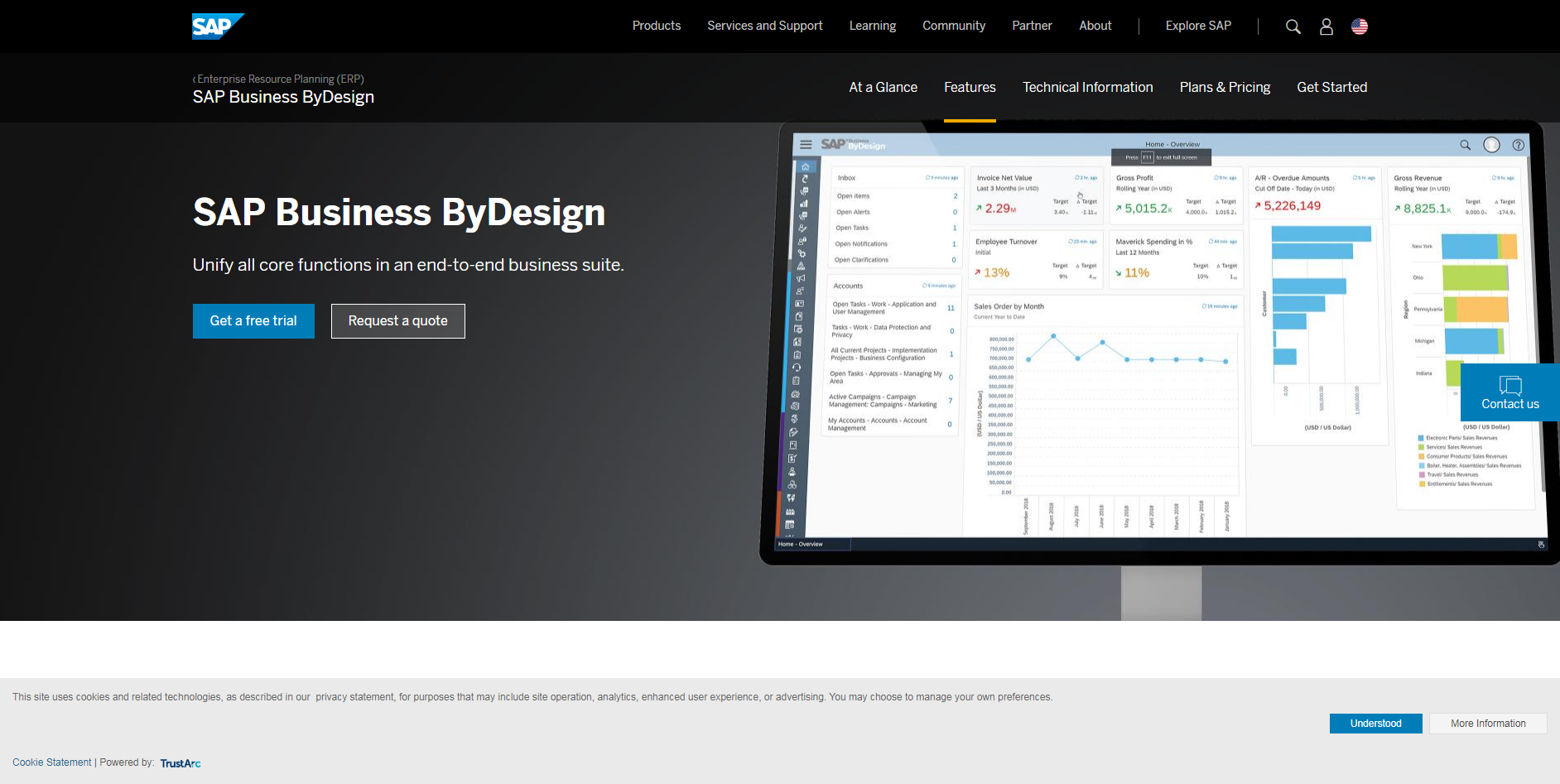
SAP Business ByDesign is used in 144 countries across 12 languages. An end-to-end business suite for small-to-medium companies and subsidiary businesses, it covers finance, CRM, HR, project management, procurement, supply chain management, manufacturing, and wholesale distribution. A great distribution CRM software.
Features
- SAP Business ByDesign allows multiple companies in multiple countries with various sets of books to use the same system at the same time
- Provides real-time A-Z views of the manufacturing process
- Integrates with other SAP and non-SAP applications
- 12+ languages supported
Pros and Cons
- Embedded business analytics, mobility, e-learning, and support
- A comprehensive set of prepackaged integrations as well as SOAP and oData web services
- Easy integrations to other SAP or non-SAP applications
- Pricing includes hosting, unlimited storage, access to all application areas (see above), support, etc.
- Updates are delivered automatically four times a year with no IT staff required
- Customization is easy to do with no IT staff required
Reviews
- 4/5 star rating on G2 (182 reviews total)
- 4.2/5 star rating on Capterra (34 reviews total)
- 4.1/5 star rating via Gartner (7 reviews total)
- 7.9/10 score via TrustRadius
Pricing
- Self-Service User: $19 per user per month
- Core User: $103 per user per month
- Advanced User: $186 per user per month
- Base Package: $1,556 per user per month
6. Spotio is the Best Wholesale CRM with a Sales Territory Mapping Feature
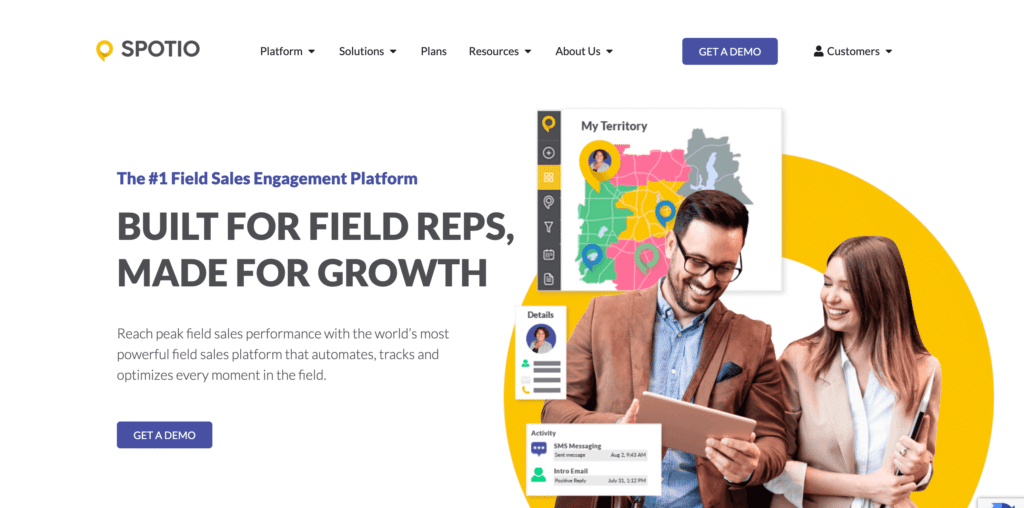
How do you divide the sales areas among your sales representatives? Overlapped sales territories cost your team time and effort, and gaps in sales areas are missed opportunities for your wholesale and distribution company’s growth.
Spotio offers a sales territory mapping solution that enables you to clearly divide the sales territory. Not only does this foster healthy competition among your salespeople but also makes it easier for you to monitor each area’s performance accurately.
You can also combine this with Spotio’s customer mapping feature to see each customer’s status at a glance (lead stage, result of last visit, and their overview data).
Features
- Built-in route planning apps and GPS tracking to track your transportation team
- Automatically log first interaction with leads, including visits, calls, texts, and emails in real-time
- Track inbound, outbound, and missed calls
- E-contract feature to accelerate deal closing time
Pros and Cons
- Rich integration options with popular sales, marketing, and other CRMs, such as SAP, Oracle Netsuite, and Google Calendar
- Location tracking to see your team’s travel path history and locate them in real-time
- Sales leaderboard to foster healthy competition among your sales reps
- Some users claimed to have issues syncing with Google Calendar
- Limited customer support
Reviews
- 4.5/5 star rating on G2 (379 reviews total)
- 4.3/5 star rating on Capterra (79 reviews total)
- No review on Gartner
- 8/10 score via TrustRadius (1 review total)
Pricing
Spotio offers two paid plans. For their prices, you’ll need to contact the team.
7. WizCommerce is the Best CRM Post-sales-Focused Wholesale Teams

In wholesale and distribution, the best CRMs offer more than just lead-closing capabilities. They also streamline critical post-sales processes. This includes managing order updates, sending invoice reminders, and maintaining comprehensive records of past orders.
WizCommerce, for example, simplifies these tasks with its robust customer account management features. Automated emails can keep customers informed about their orders, shipment statuses, and payment due dates.
Features
- Centralized customer data and order history
- Automated customer approval flow
- Geographic lead tracking
Pros and Cons
- AI-powered sales assistance
- Focused on B2B ecommerce wholesale and distribution companies
- Including a website builder feature
- WizCommerce is a relatively new wholesaler CRM with very limited reviews on app marketplaces like G2 and Capterra
Reviews
- 5/5 star rating on G2 (1 review total)
- No review on Capterra
- No review on Gartner
- No review on TrustRadius
Pricing
WizCommerce doesn’t disclose their pricing plans.
8. Method is the Best CRM Accounting-Focused Wholesale Teams

If you’re a wholesale distributor looking for a CRM that seamlessly integrates with QuickBooks or Xero, Method might be a great fit.
Its two-way integration with QuickBooks, for example, allows real-time syncing of customer information and transaction activity. This enables you to quickly generate estimates, sales orders, invoices, and other documents directly within Method, eliminating the need to switch back and forth between platforms.
Features
- Automated lead collection from Gmail, Outlook, and web forms
- Mobile app
- Secure online payment that sync to QuickBooks
Pros and Cons
- Various integration options with leading marketing and payment apps, such Mailchimp, PayPal, and Google ecosystem
- Clean and modern user interface
- Customer support and onboarding process can be improved
Reviews
- 4.4/5 star rating on G2 (297 reviews total)
- 4.2/5 star rating on Capterra (118 reviews total)
- No review on Gartner
- 9.1/10 score via TrustRadius (35 reviews total)
Pricing
- Contact Management: $25 per user per month
- CRM Pro: $44 per user per month
- CRM Enterprise: $74 per user per month
What Should Wholesalers and Distributors Look for in a CRM?

It all depends on your needs. Start by having a candid discussion about the following questions.
- Whose goals and objectives take priority? (e.g., executives, stakeholders, sales, etc.) If you want to increase sales, but executives want an analytical CRM, this will create conflict.
- Who will be the primary end-user of your CRM software? (it should be the same as above).
- What are their goals and objectives? These goals need to be congruent with the group above. If increasing sales and revenue is the primary goal, your sales team should be the primary end-user of your CRM.
- Which metrics and KPIs will be used to verify success? You don’t need a laundry list of metrics and KPIs to start. Start with the most important metrics, then work from there.
Here’s why this matters. CRM software comes in four varieties.
- Strategic: This is a macro, high-level view of CRM that caters to managers, directors, and executives. This type of CRM is implemented across several departments (IT, sales, marketing, support, service, etc.) focused on broad changes across the company as a whole.
- Operational: This is a meso-level view of CRM focusing on three specific areas — sales, marketing, and service/support. When we talk about CRM, we’re usually talking about operational CRM.
- Analytical: This type of CRM is designed for business analysts and data scientists; the primary focus is an investigation, whether that takes place at a macro, meso, or micro level. Analysts collect and present the data in a format that managers use to make decisions.
- Collaborative: This approach focuses on internal and external dialogue — wholesalers sharing data with manufacturers and retailers.
As a wholesaler, this is crucial. If you’re going to invest the kind of money I’ve discussed above, you’ll want to make sure that you’re purchasing CRM software that will move you closer to your goals.
Wholesalers Need the Best CRM Software

CRM software is an important component that keeps businesses together. Clarify your goals and objectives, then use them to choose the best CRM software for your wholesaling business.
For more information on Pipeline, try it free or book a demo! Our sales CRM experts would be happy to lend an ear and guide you on this process.
FAQs on the Best CRM for Distributors and Wholesalers
Answering some common questions about wholesale CRM, CRM for distributors, and Pipeline CRM.
1. What are the Key Features to Look for in a Wholesale and Distributor CRM?
Every wholesaler and distributor has unique business needs, but certain CRM features are essential for maximizing your investment:
- Workflow automation: look for a CRM that automates more than just email marketing. For example, assigning new leads to specific sales reps, report generation, and next-step creation after a deal status changes.
- Rich and smooth integration: boost productivity by connecting your CRM with essential applications. Key integrations often include the Google ecosystem, QuickBooks, Mailchimp, and communication tools like Aircall.
- Robust data customization: your CRM should offer flexible customization options. This includes customizable data fields, the ability to manage single or multiple sales pipelines, and data formatting and validation functionalities.
2. What is the ROI of Implementing a Wholesale and Distributor CRM?
Investing in a CRM for your wholesale or distribution business can yield a significant return. For every dollar spent, the projected return is $30.48, and your initial investment could be recouped in six months or less. For more detailed information on CRM ROI, check out our blog on CRM statistics.
3. Why Should I Choose Pipeline CRM as My Wholesale and Distributor CRM?
Pipeline CRM stands out as one of the best wholesale and distributor CRMs due to the following reasons:
- Comprehensive activity and sales tracking: customize your Pipeline CRM sales workflow to accurately monitor your inside and outside sales team performance.
- Effortless data organization: Pipeline CRM keeps your customer, distributor, and other sales-related data clean and accurate with our locked and required fields as well as conditional formatting and de-duplication prevention solutions.
- Excellent customer service: our customer service team is always available to promptly address your concerns and provide you with personalized support for your unique needs.
XpressConnect, a satisfied distribution customer, has been using Pipeline CRM for nearly a decade and has experienced firsthand the positive impact on their business. Pipeline CRM has enabled them to scale their operations and expand their customer base nationwide. Read their case study here.



